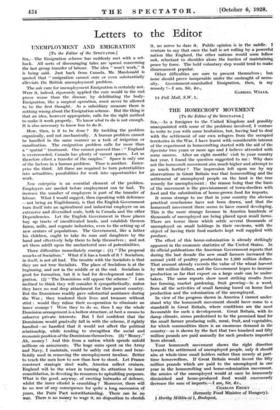THE HOMECROFT MOVEMENT [To the Editor of the SPECTATOR.]
SIR,—As a foreigner to the United Kingdom and possibly unacquainted with some of the problems involved, I venture to write to you with some hesitation, but, having had to deal with the settlement of our own refugees from the occupied territories in the War, I have learnt with considerable interest of the experiment in homecrofting started with the aid of the Spectator two years or more ago and I believe attended with some success. After an eight months' visit to your country last year, I found the question suggested to me : Why does not the homecroft movement aim much higher and attempt to go much further ? The impression left upon me by my observations in Great Britain was that homecrofting and the settlement of unemployed people on the land is the true remedy for unemployment : the reason being that the basis of the movement is the provisionment of town-dwellers with food and the substitution of home-grown food for imports.
It seems strange to me that in your country the obvious practical conclusions have not been drawn, and that the homecroft movement there seems to have ceased developing. This is the more strange because in America hundreds of thousands of unemployed are being Placed upon small farms. There are towns there which settle several thousands of unemployed on small holdings in their environs, with the object of having their food markets kept well supplied with produce.
The effect of this home-colonization is already strikingly apparent in the economic statistics of the United States: In its official publications the American Government reports that during the last decade the new small farmers increased the annual yield of poultry production to 1,200 million dollars. That amount already exceeds the value of the wheat harvest by 800 million dollars, and the Government hopes to increase production so far that export on a large scale can be under- taken. The same reports show most striking results from bee farming, market gardening, fruit growing—in a word, from all the activities of small farming based on home food production and the colonization of the unemployed.
In view of the progress shown in America I cannot under- stand why the homecroft movement should have come to a standstill in Great Britain, where conditions are the most favourable for such a development. Great Britain, with its damp climate, seems predestined to be the promised land for the small farmer producing milk, meat, fruit, and vegetables, for which commodities there is an enormous demand in the country—as is shown by the fact that two hundred and fifty million pounds are paid annually for such products imported from abroad. _ .
Your homecroft movement shows the right direction towards the settlement of unemployed people, only it should aim at whole-time small holders rather than merely at part- time homecrofters. If Great Britain would invest the fifty million pounds which are paid to the unemployed in one year in the homecrofting and home-colonization movement, the armies of the unemployed would at once be immensely diminished and home-produced food would enormously decrease the sum of import.i.—I amt. Sir, &c., CHARLES ERERY
(formerly Food Minister of Hungary). 1 Horthy Miklos-tit 1, liudapest.






















































 Previous page
Previous page